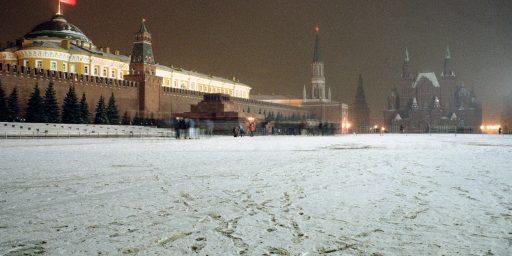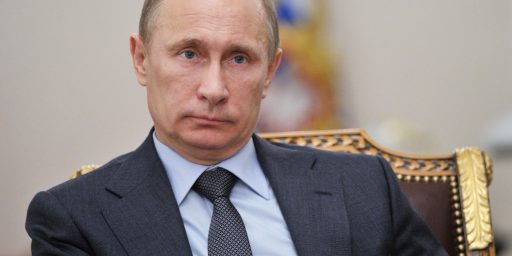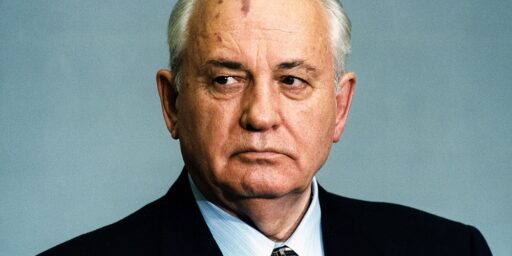Kick Russia Off the Security Council?
A bad idea backed up by worse reasoning.

The WSJ has published an essay by Bernard-Henri Lévy with the intriguing headline “Put Ukraine on the U.N. Security Council” and with the silly subhed “Russia’s membership has no legal basis and should be transferred.” The column, alas, is based on the latter.
In Vladimir Putin’s war against Ukraine, one of his weapons is Russia’s status as a permanent member of the United Nations Security Council, which entails the power to block any resolution. It’s a legacy of World War II and the decision to reserve this status to the five victors, including the Soviet Union.
But the Soviet Union no longer exists. Russia’s membership is owing to another, far more obscure event, a meeting on Dec. 21, 1991. The U.S.S.R. was about to be officially dissolved. Leaders from 11 of the 15 newly independent states—all but Georgia and the Baltics—gathered in Alma-Ata, Kazakhstan (now Almaty).
The result, after a few hours of debate: a letter from Russian President Boris Yeltsin to the U.N. secretary-general informing him of the establishment of the Commonwealth of Independent States and the agreement that Russia would succeed the Soviet Union at the Security Council.
The recipient might have observed that nothing in the U.N. Charter allows a group of states to dispose of the seat of a permanent member. He might have objected to the notion of a “successor state,” which appears in no law or official text. He might have noted that nine of the 11 states that made this decision weren’t U.N. members at the time. (Ukraine and what is now known as Belarus were founding members, giving the Soviets three seats for the price of one.) Given the novelty of the situation and the importance of the Security Council, the secretary-general should at least have demanded a formal debate in the General Assembly. Instead, Yeltsin’s notification was ratified without discussion. Many U.N. member countries heard about it on the news.
Russia’s permanent membership and the veto power it confers have no legal basis.
This is just nonsense. For the entirety of its existence, the world community considered the Soviet Union to be Russia and its satellite states because, well, that’s what it was. There was simply no question that, with the breakup of the Soviet Union, Russia would assume the seat. There was no debate because the outcome was obvious. And, with the exception of the occasional silly op-ed, nobody has questioned it since.
Now, I don’t disagree with BHL here:
The Russian Federation has terrorized the world for decades
and could certainly see it as a basis for a debate on whether Russia’s favored status should be revoked.
But not on this basis
under a false pretense.
Again, that’s nonsense. The Soviet Union was the successor state to tsarist Russia and Russia was the natural successor state to the Soviet Union. It simply never occurred to world leaders to question that obvious fact and, regardless, the UN General Assembly made that assumption a legal reality by acclamation.
Which brings me to an idea: Ask the U.N. to reopen the dossier and to re-examine the original power grab that laid the foundation for our current disorder. Consider how, from Bucha to Mariupol and through to the deportation of thousands of children out of Donbas, Russia has flouted the foundational principles of the U.N. And revoke the authority that Yeltsin and Mr. Putin snatched.
What then would become of the 1945 pact and the heritage of the “Great Patriotic War”?
The Red Army’s First Ukrainian Front did more than its share in World War II—among other things, liberating the Auschwitz death camp. And if there’s a former Soviet country that stands for anti-Nazism today, it’s Volodymyr Zelensky’s Ukraine.
Ukraine can and should inherit the rights of a fallen Russia. Remove the Russian Federation from its seat as a permanent member and transfer it to Ukraine. Memory permits it, morality wishes it, and an open debate among united and sovereign nations could decide it.
Let’s leave aside the silliness of whether Russia was legally the successor state or whether three-plus decades of having been legally treated as such can simply be wished away. I’m at least mildly sympathetic to the idea that, as an international pariah, Russia should lose its status as a permanent member of the Security Council.
But, seriously, we’re going to replace them with Ukraine?
The creation of the Permanent Five wasn’t a reward for valiant effort against the Nazis. Hell, the French surrendered to the Nazis and fired on American and British forces during Operation Torch. It was about power politics.
One of the many lessons of the failure of the predecessor League of Nations was that collective security can’t work if the great powers aren’t all involved. Further, there was a pretty strong possibility in 1944, when the Charter was being drafted, that the Russians (Soviets) wouldn’t remain in the Western orbit. They were, after all, allies of convenience (the enemy of my enemy is my friend) rather than shared values.
Giving each of the P5 a veto was a nod to reality: the UN couldn’t act collectively without their agreement, so allowing any of them to demur was a safety valve. If they agreed, fine. Then the UNSC could act collectively. If not, no harm, no foul—it was just status quo. Individual powers or a coalition of the willing could act but not under UN auspices.
There has been periodic talk at least since the end of the Cold War that the P5 is an artifact of its time and should be revamped. In theory, I agree with that. If we were putting this thing together now, it likely wouldn’t look like it does. But the current P5 has inertia going for it and there’s zero consensus as to who would be added, much less subtracted.
China sure as hell isn’t going to set the precedent that a P5 member can be voted off the island because the others don’t agree with their actions. And, frankly, if the criteria is absolute fealty to international law and, as a minimum, not invading sovereign states without Security Council approval, the United States is not exactly without sin.
And, seriously, Ukraine?
There’s a pretty strong case for adding Japan and Germany, which have been a great powers for more than a century. Yes, the atrocities of World War II are still within living memory but they’ve long since been rehabilitated. Germany has been a NATO member since 1954 and Japan has been a treaty ally since 1960.
While India had a better case in the pre-Modi era, it’s a budding power with over a billion people.
Brazil has a pretty good case as the Latin American representative.
There’s not an obvious African representative but, if we’re going to expand the permanent membership, there would need to be one. Maybe the OAS gets a seat.
Regardless, you see where this is going: once the membership is open for discussion, it gets messy fast. If the permanent members retain a veto power, a significantly expanded version makes it even more unwieldy than it already is.






If we’re questioning the USSR to Russia shift, shouldn’t we also look at how the People’s Republic ended up with a seat which was clearly intended for the true Chinese government which, um, obviously, is on a rocky little island?
We’ve already achieved a state of complete impotence where nothing can be done about anything. One could argue that adding even more nations would have no noticeable effect since the Security Council has no effect on the real world. Imagine a US Senate, but with 300 assholes, or 400, each with a stick to poke in the spokes. Bad, sure, but would it really be any worse than what we have?
Despite all the other countries speaking one language, and Brazil speaking a different one? Security is not necessarily cultural, but still…
@Michael Reynolds: The Security Council really only works when the West, Russia, and China are all aboard. That was largely true from 199o-2001 and sporadically true through 2011. I think the Libya mission pretty much ended the era of cooperation and trust.
@Michael Cain: They’re the only country in the region that’s even arguably a world power. Their GDP is on par with Canada and Russia. Mexico isn’t that far behind, I guess, but no other country in the region is an economic power. Similarly, Brazil’s military spending is on par with Spain and Poland and none of the other countries even make the list.
@James Joyner:
Brazil has a defense industry. the rest of Latin America does not.
As to the topic, I wouldn’t mind seeing Russia kicked off the planet. I rank that as slightly likelier than it being kicked off the security council.
AFAIK, there is no mechanism to remove Russia, and the P5 does not want to add more countries and dilute their authority. And the system design (where one veto can stop a resolution) is not amenable to lots of countries having that – it would just make the organization even less relevant.
The UN was designed for a post-WWII world that doesn’t exist anymore. Even if it were possible to kick Russia off, what would that accomplish?
If the UN is indeed useless, then why not? Kicking them off wouldn’t accomplish anything…and keeping them on wouldn’t either. Do it for the lulz.
YOLO
The Security Council was a product of the times, a compromise required to get agreement to the UN Charter. Now we’re stuck with it. Sort of like much of the U. S. Constitution.
We don’t need a legal reason we have to do it, we need a legal pretext for doing what we want.
We’re talking about the law, it doesn’t have to make sense.
“We”, meaning the UN, don’t want to do anything.
What no one really wants to say is that the actual criteria for P5 membership is having enough nukes to hold the entire planet hostage if you are sufficiently unhappy with what the other P5 members are up to.
@Stormy Dragon: While all of the P5 eventually became nuclear powers, the USA was the only one (technically, just ‘atomic’) when the Charter was ratified.